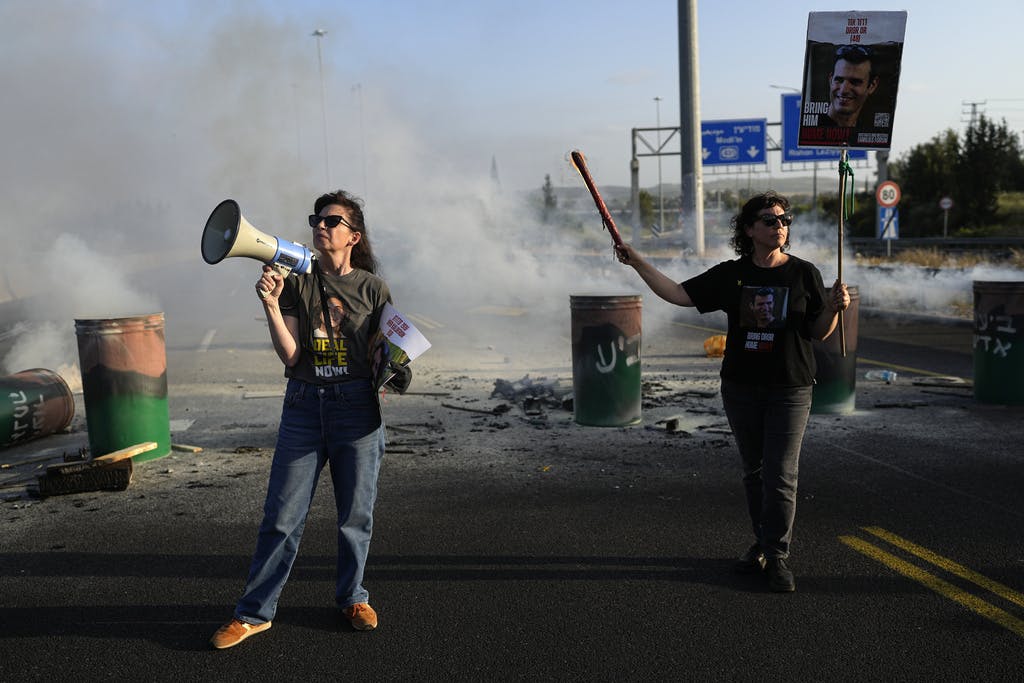Ousting Hamas Terrorists From Rafah Again Looks To Be Top Israeli Priority
Washington officials now acknowledge that America’s months-long diplomatic push for a Gaza cease-fire and hostage release has hit a brick wall. Officials now blame Hamas, rather than Israel, for blocking any cease-fire.

As Israelis cleanse their homes of leavened bread in the leadup to Passover’s first night on Monday, many believe the tables are now also cleared for a final assault on Hamas. As a direct battle with the Islamic Republic appears to be largely postponed for now, a Rafah operation seems to loom large.
Since October 7, the Iranians have been employing proxies to launch an ever-escalating war on the Jewish state, and last week, for the first time, they attacked Israel directly. Last night’s response was designed to convey the message that while Israeli defenses and a regional alliance blocked more than 350 incoming drones and missiles, Iran’s sensitive military installations — including nuclear sites — are defenseless against a small number of drones.
The Israeli attack, then, was calibrated to make that equation clear to the Iranian leadership, while at the same time allowing the mullahs enough room for deniability to avoid a response and further escalation. Predicting no Iranian retaliation, many Israelis say they now urgently need to complete the defeat of Hamas.
Publicly, Washington’s opposition to an Israeli assault at Gaza’s southernmost city has changed little. Nevertheless, four Hamas battalions are holed up at Rafah and its environs, which are the smuggling lifeline of arms to the terror organization. Crucially, Rafah is also likely where the terrorist organization hides most of the remaining 133 hostages, dead or alive, that it kidnapped on October 7.
Washington officials now acknowledge that America’s months-long diplomatic push for a Gaza cease-fire and hostage release has hit a brick wall. Officials now blame Hamas, rather than Israel, for blocking any “cease-fire,” a rallying cry for anti-Israel crowds at places like Dearborn, Michigan, and Columbia University.
“The only thing, the only thing standing between the Gazan people and a cease-fire is Hamas,” Secretary Blinken said Friday at Capri, Italy. Hamas “has rejected generous proposals from Israel. It seems more interested in a regional conflict than it is in a cease-fire that would immediately improve the lives of the Palestinian people.”
If so, Israel “must finish the most urgent task we aimed to do after October 7,” a former Israeli national security adviser, Yaakov Amidror, told the country’s Channel 11 on Friday. “We need to dismantle the Hamas military and bring the hostages home, so the army must operate at Rafah.”
America is “committed, as Israel is, to ensuring that Gaza cannot be controlled by Hamas,” Mr. Blinken said Friday, adding nevertheless that “in terms of major military operations in Rafah, that’s something that we don’t support, and we believe that the objective can be achieved by other means.”
Yet, would America at least yellow-light a less than “major” Rafah operation? Mr. Blinken declined to comment on Thursday’s strike in Iran, yet Israelis believe that their measured response regained them some global sympathy. Support of Israel had widely dimmed in recent months as images of suffering in Gaza filled television screens worldwide. Last Saturday’s attack shocked many Westerners.
“Israel and its people have our full solidarity and support and we reaffirm our commitment towards Israel’s security,” the Group of 7 democracies said in a joint statement Friday in conclusion of their Capri meeting. “Iran’s actions mark an unacceptable step towards the destabilization of the region”
Hours earlier, on Supreme Leader Khamenei’s 86th birthday early Friday morning Iran time, several explosions were felt at the city of Isfahan. While Israeli officials remain mum on their role, the attack is widely believed to have been a pin-point strike by drones that were launched from within Iranian soil.
The likely target was a military air base in the Isfahan province, far enough from the city to avoid any civilian casualties. The base reportedly houses and manufactures drones and ballistic and cruise missiles, and is believed to have been the main source of last Saturday’s attack. Reliable damage assessments are unavailable, but are likely more painful than Iranian official statements claiming no assets were harmed.
Allowing the Iranians such deniability was likely part of the calculations of Israeli decision makers as they designed their response to last week’s attack. A Goldilocks approach — not too hot, not too cold — was calibrated to satisfy demands from Washington and other allies to avoid major escalation.
Meanwhile near Gaza, American, Israeli, United Nations, and Egyptian officials are meeting every evening to assess the humanitarian situation in the Strip, Israel Hayom’s diplomatic correspondent, Ariel Kahana, reports. “There is no shortage of food in Gaza and there never was, and the Americans well know it,” he quotes an official as saying.
Israelis seem resigned to the notion that the war Iran and its proxies launched on October 7 would likely last months or longer. Battling Hezbollah, the Houthis, and eventually the head of the snake at Tehran seems to be pushed to the back burner for now. Defeating Hamas, including at Rafah, is back on top of Israel’s to-do list.

